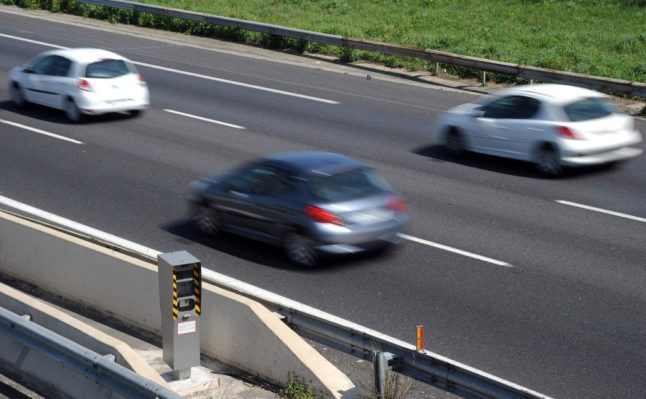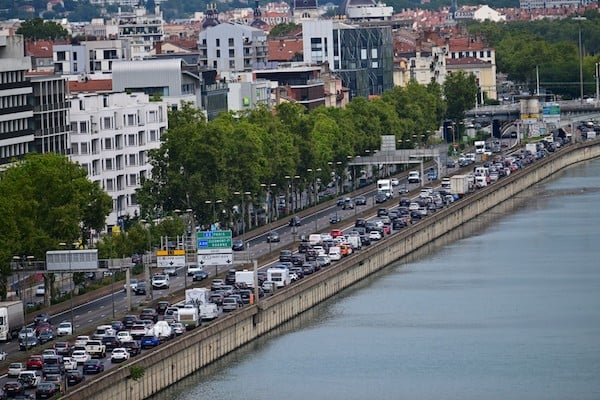Speed
Let’s start with speed limits, which will see several changes in 2024.
Motorists caught speeding up to five kilometres over the limit will no longer risk losing a point on their driving licence – but will still be subject to fines – according to a government decree published in the country’s Journal Officiel in early December.
France decreases penalties for ‘minor’ speeding offences
In most places the speed limits themselves will stay the same, with the possible exception of Paris.
City hall wants to lower the speed limit on the Paris ring road to 50km/h – dropping from the current 70km/h in September 2024, following the Olympic Games.
However the government is reportedly not keen on the idea and may block it. Expect arguments next year before it is decided one way or the other (although most of the time you’re doing well if you manage to get above 30km/h on the famously traffic-choked périphérique).
Speed limit on the Paris ring road to drop down to 50km/h
Costs
Running a car can be a costly business, and there are some changes afoot here too
Several regional authorities in France are planning to increase fees for processing new vehicle registration documents – known colloquially as the carte grise – in 2024. Full details here: The extra cost of buying a car in France in 2024
The cost of running an electric car is considerably lower than running a petrol or diesel car, but they are more expensive to buy – meaning that for many lower income households, switching is not a possibility.
From 2024, however, lower-income motorists in France will be able to take advantage of a government-backed deal for leasing electric vehicles, aimed at boosting take-up by helping lower-income households with the costs.
France to launch €100 per month electric car lease scheme
French President Emmanuel Macron also announced a new fuel subsidy, which “could reach up to €100 per year”, to help motorists deal with rising fuel costs. The measure was introduced in the 2024 budget.
Whilst no details have been officially confirmed French media report that the average qualifying motorist would save €0.20 per litre over a six month period as a result of the new ‘fuel cheques’.
Not everyone will be eligible, however.
Who could benefit from France’s planned new fuel subsidy?
Meanwhile, Oil and gas giant TotalEnergies announced in September that it would extend its fuel price cap of €1.99 per litre beyond the end of the year.
France’s TotalEnergies to extend fuel price cap until 2024
Driving age
17-year-olds in France are now allowed to obtain a permis de conduire, as of January 2024, according to Le Parisien. Previously, licences were only issued to people 18 and up.
The same conditions for holding a type ‘B’ licence will apply, including passing the code and practical tests after 20 hours of lessons, as well as holding a probationary licence for the first three years.
New laws
Not exactly a new law per se, but a new application of fines. The law on winter tyres was introduced in 2022, but the first two winters were ‘grace periods’ when drivers would only be warned by police.
In 2024, fines start coming into force for motorists in mountainous areas of France who do not have winter tyres on their vehicles. Full details: MAP: Where in France do I need snow tyres this winter?
It has been several years – and many delays and U-turns in the making – but France will finally introduce a vehicle safety test for motorbikes and scooters starting in April 2024. The contrôle technique vehicle inspection is already compulsory for cars.
Contrôle technique: What we know about the new French safety checks for motorbikes
Also from April 2024, the French government has announced, the green car insurance cards found in the windscreens of French vehicles will be done away and replaced by an automated system accessible to law enforcement.
France will no longer require cars to show insurance green cards
Insurance rules themselves stay the same, it’s just the green cardboard ticket that is being done away with.
Diesel vehicles already face some restrictions in French cities and are set to face more in the months and years to come, because of their relatively higher rate of emissions.
Part of the plans include bans on certain areas of certain cities – and the number of areas enforcing these rules is set to increase throughout 2024 and 2025.
Is France really banning diesel vehicles from cities?
And finally, following a trial period in 2023, a new road sign will soon be popping up on roads around France – and it carries a hefty fine if you fail to respect it.
The new French road sign that can net you a €135 fine if you ignore it



 Please whitelist us to continue reading.
Please whitelist us to continue reading.
Member comments